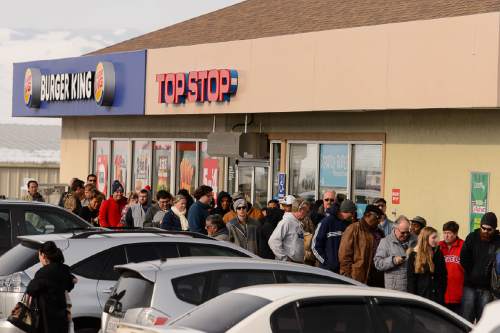This is an archived article that was published on sltrib.com in 2016, and information in the article may be outdated. It is provided only for personal research purposes and may not be reprinted.
All those Utahns lined up in front of gas stations and convenience stores in the border towns of Wyoming and Idaho, scrambling to buy an infinitesimally small chance to win a stupendously large amount of money in the Powerball lottery, is enough to make one wonder.
How come we don't have a lottery here? Why don't we have a way to raise money for schools, highways, etc., that only taxes the willing, that gives us all a chance to have a little harmless fun, that doesn't encourage so many good people to drive all that way, burn all that gas, and spend their money (and pay taxes) on other things while they are there?
The short answer is the argument — promoted, but not invented, by Utah's prevailing religious tradition — that a lottery is a cruel way for a state to raise even the most necessary revenue because it comes down the hardest on those who can least afford to pay.
But if that argument holds against selling lottery tickets to those who can't really afford to buy them, why doesn't it also hold true for a tax system that places a disproportionately large share of the burden on those who can least afford to pay it?
Because that's what Utah has.
Arguably, it isn't as bad here as it is in some other states. Last year, an outfit called the Institute on Taxation and Economic Policy, which worries about financial inequality, ran some numbers and determined that, out of 50 states, Utah's tax policy was the 34th most regressive. That is, 33 states were worse than we are at making the poor and middle class pay a disproportionate share of taxes compared to the rich and super rich.
But we'd be better than that if it weren't for the state's essentially flat income tax rate, which has cost Utah schools hundreds of millions of dollars since being adjusted downward under Gov. Jon Huntsman a decade ago.
The primary source of revenue for Utah's public education system is an income tax structure that favors the rich. The state relies on sales taxes, which dig much more deeply into the purses of the poor, for just about everything else.
If anything, this regressive tax structure — one that helps those at the top of the income ladder fight off anyone who might try to climb up after them — is more cruel to the working classes than any lottery would ever be.
Because nobody is forced to buy a lottery ticket. But we all have to pay our taxes. Unless we are rich enough to avoid paying our fair share.
Maybe that's why so many of us dream of hitting the Powerball jackpot.



